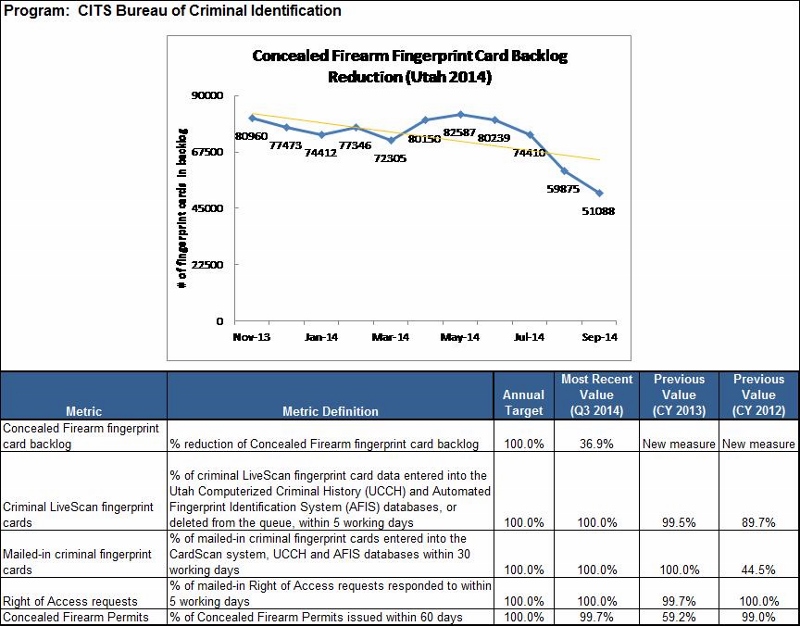The Bureau of Criminal Identification is divided into various functions which include, a records, fingerprinting, training, data analisys, investigations, and more. Please see Background section for more detail on specific functions.
During the 2015 General Session, the Legislature appropriated for Fiscal Year 2016, $18,416,900 from all sources for CITS Bureau of Criminal Identification. This is a 30.7 percent increase from Fiscal Year 2015 revised estimated amounts from all sources. The total includes $1,012,800 from the General/Education Funds, an increase of 8.3 percent from revised Fiscal Year 2015 estimates.
In addition to statewide compensation and internal service fund cost increases, the following appropriation adjustments were made during the 2015 General Session:
The Department reports that they believe steep increase in dedicated credit revenue is due to major news events related to Sandy Hook shootings. They report that while revenue increased one-time, costs did not increase the same amount over the same time. The Legislature should consider at least a one-time $500,000 amount of General Fund revenue as the Department report this can be reduced without affecting operations.
The Bureau of Criminal Identification (BCI) was established in 1927. To fulfill the required duties, BCI has been divided into seven sections. They are as follows:
- The Record Section is responsible for entering data into the Utah Computerized Criminal History (UCCH) file of all submitted criminal arrests and the outcome of these arrests. Expungement eligibility is also determined by this section and upon issuing an Expungement Order, it is its responsibility to expunge the Utah record and forward all necessary paperwork to the FBI to assure the accuracy of an individual's record. Employment background checks for qualifying entities are also processed in this section. The UCCH database contains over one million arrest records.
- The Fingerprint/AFIS Section verifies and classifies all fingerprints that are submitted to BCI whether for criminal or applicant purposes. BCI is a member of the Western Identification Network (WIN) which allows Utah agencies to access data from the Automated Fingerprint Identification System (AFIS) consisting of seven western states, the California Department of Justice (CAL-DOJ) and the Washington State Police.
- The Telecommunications/Quality Assurance Section operates as a 24x7x365 helpline for all criminal justice agencies statewide and across the country. BCI is the Control Terminal Agency for the National Crime Information Center (NCIC) and the National Law Enforcement Telecommunications System (NLETS). This section also provides ongoing research into open arrest records and prosecution records in cooperation with the courts of Utah to assure record quality and reliability.
- The Auditing and Training/Data Collection and Analysis Section is responsible for the training in the proper use of the Utah Criminal Justice Information System (UCJIS) files. Proficiency testing of all users and auditing agencies is also done by this section. The gathering and compiling of statewide statistics and producing the "Crime in Utah Report" is performed by this section. BCI is the Missing Person Clearinghouse for Utah and resides within this section.
- The Support Service Section assists citizens wishing to review or challenge their own Utah criminal record as well as processing all incoming mail and tending to the financial issues that are handled through the bureau.
- The Investigations Section issues Private Investigator and Bail Enforcement Agent licenses. Investigations are also handled through the firearms section. Carry Concealed Weapon (CCW), Private Investigator and Bail Enforcement appeal boards are overseen by the Firearms staff. Employees of the Investigations Section work closely with firearms instructors/dealers to ensure state and federal laws are followed.
- The Firearms Section conducts background checks on individuals wishing to purchase a firearm. Additional research is conducted on those individuals missing data on their criminal record. Background checks are also conducted on those wishing to obtain a Concealed Weapon Permit. Permits are created after an individual passes the required background check. This section is also responsible for the suspensions and revocations of concealed permits.
COBI contains unaudited data as presented to the Legislature by state agencies at the time of publication. For audited financial data see the State of Utah's Comprehensive Annual Financial Reports.
